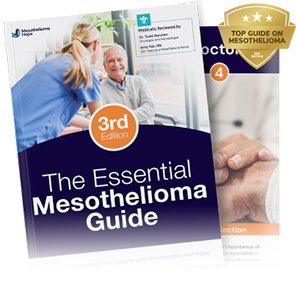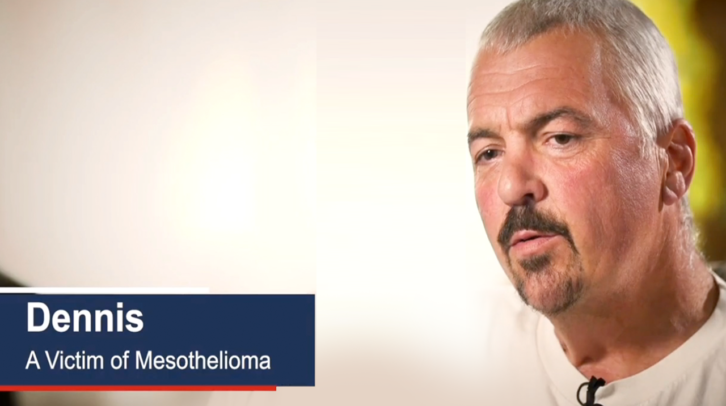What Is Mesothelioma?
Malignant mesothelioma is a rare cancer that grows in the mesothelium, the protective lining covering various organs in the body.
- About 3,000 Americans are diagnosed with mesothelioma each year.
- Patients typically report flu-like symptoms and fluid buildup.
- Veterans account for roughly 30% of all mesothelioma cases.
- Patients may qualify for financial compensation averaging $1 million to $1.4 million.
Mesothelioma usually develops in the lining of the lungs (pleura) or abdomen (peritoneum). Tumors can sometimes form in the lining of the heart (pericardium) or testes (tunica vaginalis).
Request your Free Mesothelioma Guide to learn about getting medical and financial aid for mesothelioma.
How Does Asbestos Exposure Cause Mesothelioma?
Asbestos is the only known cause of mesothelioma.
Here’s how asbestos causes mesothelioma:
- Exposure – When asbestos is disturbed, people may inhale or ingest fibers.
- Buildup – Asbestos fibers become lodged in the linings of certain body parts and accumulate with repeated exposure.
- Damage – Asbestos fibers never leave the body and irritate healthy tissue.
- Cancer – After 10-50 years, the irritation causes cancer tumors to form.
For decades, companies manufacturing asbestos-containing products hid the link between asbestos and mesothelioma to keep making profits. Millions of civilian workers, military personnel, and their families were exposed without knowing the risk factors.
“I was exposed to asbestos through Sheetrock® products, the mud, through gaskets in piping, through respirators. The cartridges and the filters had asbestos in them. All through my career.”
– John Stahl, stage 4 mesothelioma survivor
Anyone exposed to asbestos — directly or indirectly — is at risk of developing mesothelioma and other diseases like lung cancer or asbestosis later in life.
Malignant Mesothelioma Symptoms
Every type of mesothelioma has unique symptoms based on where it forms in the body. That said, some general mesothelioma symptoms are common among many patients.
Symptoms of mesothelioma may include:
- Abdominal or chest pain
- Fever
- Fluid buildup in the chest (pleural effusion)
- Fluid buildup/bloating in the abdomen (ascites)
- Loss of appetite
- Nausea and vomiting
- Night sweats
- Persistent cough
- Shortness of breath
- Weight loss
Patients whose cancer hasn’t spread yet usually experience mild and vague symptoms. Sometimes, patients aren’t aware they’re sick until the cancer is quite advanced.
“If you feel like you’re not getting better and that this is something new for you, it’s best to encourage your doctor to proceed with more testing.”
— Amy Fair, RN, Mesothelioma Hope Patient Advocate
Find mesothelioma doctors in your area and get help scheduling appointments with our Free Doctor Match service.
Mesothelioma Types
There are four types of mesothelioma from asbestos, each affecting a different location within the body. Learn about the types below.
Pleural Mesothelioma

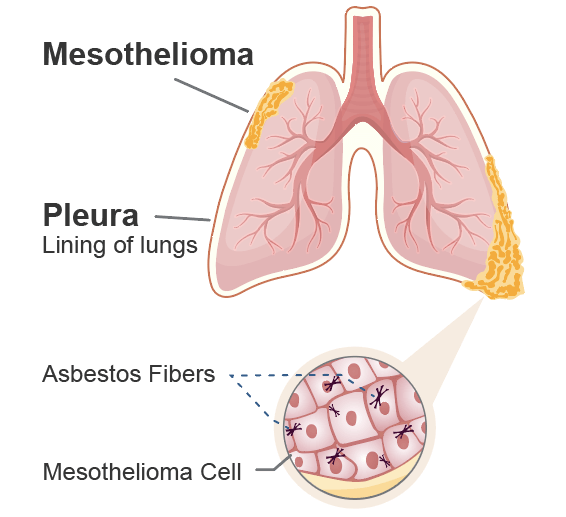
Malignant pleural mesothelioma forms in the lining of the lungs and chest wall.
It is the most common mesothelioma type and makes up over 75% of cases, according to the American Cancer Society (ACS).
Pleural mesothelioma has four stages. The cancer hasn’t spread far in the early stages (1 and 2) and is often treatable. However, most patients get diagnosed later (3 and 4) when tumors have spread.
Doctors often treat pleural mesothelioma with thoracic (chest and lung) surgery to remove tumors, the pleura, and sometimes the lung closest to the cancer. Patients may also qualify for chemotherapy, radiation, and immunotherapy.
Peritoneal Mesothelioma

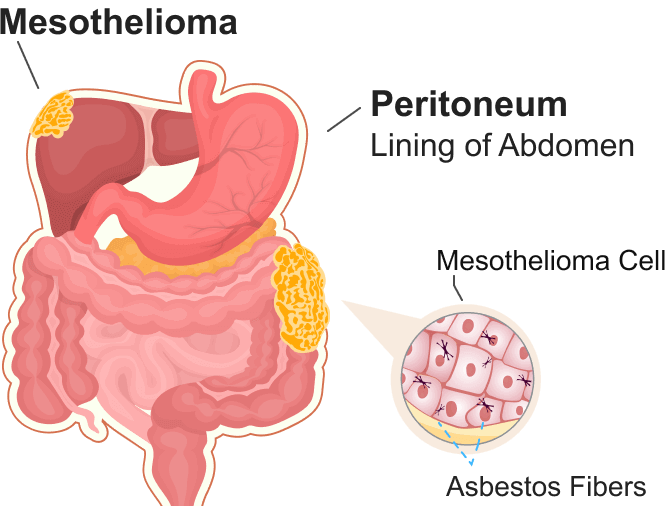
Peritoneal mesothelioma is the second most common type, accounting for 10% to 16% of cases, according to MD Anderson Cancer Center.
This type of mesothelioma develops in the abdomen lining after swallowing asbestos fibers. Peritoneal mesothelioma patients have higher survival rates than patients with other types of this cancer, thanks to effective treatments.
A 2022 article in the Journal of Clinical Haematology stated that 50% of peritoneal mesothelioma patients live at least 5 years after diagnosis if they undergo cytoreductive surgery with HIPEC (heated chemotherapy).
Pericardial Mesothelioma
Pericardial mesothelioma forms in the tissue around the heart. This type accounts for fewer than 1% of all mesothelioma cases and has a poor prognosis. A 2021 study found that pericardial mesothelioma patients have a median life expectancy of 2 months after diagnosis.
Testicular Mesothelioma
Testicular mesothelioma develops in the lining of the testes. It’s quite rare but very treatable. Just 151 cases were reported in the U.S. over 11 years. The average life expectancy of patients was 72.5 months (over 6 years), according to a 2022 review of the National Cancer Database.
The Four Stages of Mesothelioma Cancer
The four stages of mesothelioma allow doctors and patients to understand how far the cancer has spread through the body.
Doctors use this staging information to determine which cancer treatments will help patients live the longest.

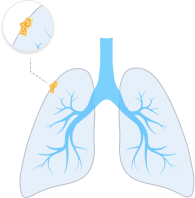
- The cancer has not yet spread beyond its origin.
- The average life expectancy is about 21 months.
- Treatments may increase survival time by several months or years.

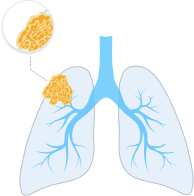
- The cancer has spread slightly, possibly into nearby lymph nodes.
- The average life expectancy is about 19 months.
- Many treatments are still available to help patients live longer.

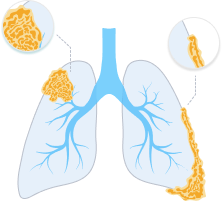
- Mesothelioma has spread into nearby tissues or lymph nodes.
- The average life expectancy is around 16 months.
- Treatments focus on slowing disease spread and managing pain.

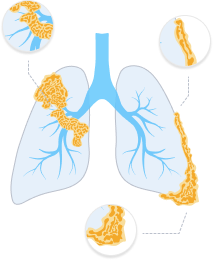
- The cancer has invaded distant parts of the body.
The average life expectancy is about 12 months.
Patients can undergo palliative (pain-relieving) treatments.
How Do I Know If I Have Mesothelioma?
Getting an accurate mesothelioma diagnosis is the first step in receiving treatment you’ll need to live longer.
To diagnose mesothelioma, doctors typically start with a physical exam and end with a biopsy.
Doctors take the following steps to diagnose mesothelioma:
- Physical exam: Patients complaining of possible mesothelioma symptoms should get a physical and tell their doctor about prior asbestos exposure.
- Imaging tests: Scans such as chest X-rays, CT scans, and MRIs allow doctors to look inside the patient’s body for possible signs of mesothelioma (abnormal growths or masses).
- Biopsy: A biopsy is the only way to confirm a diagnosis of mesothelioma. Doctors examine a fluid/tissue sample under a microscope for any mesothelioma cells. There are three main mesothelioma cell types: epithelioid, sarcomatoid, and biphasic.
- Second opinion: Patients should get a second opinion, no matter the diagnosis. With a second opinion, another mesothelioma specialist will review the original results and recommend the following steps if a patient is misdiagnosed.
Once a mesothelioma diagnosis has been confirmed, patients can work with their doctor to develop a treatment plan that best suits them.
Find mesothelioma specialists who can confirm a diagnosis with our Free Doctor Match.
14% of Mesothelioma Cases Are Misdiagnosed
Unfortunately, since it is so rare, mesothelioma is often misdiagnosed as a more common disease like lung cancer. A study from CA: A Cancer Journal for Clinicians found that 14% of mesothelioma cases are misdiagnosed.
“Because mesothelioma is such a rare cancer, it’s common for the diagnosis to either not be established the first time, or to be the wrong diagnosis because it can look like other diseases.”
— Dr. Joseph Freidberg, mesothelioma specialist
A mesothelioma misdiagnosis can prevent patients from getting the right treatments and give the disease more time to spread.
Mesothelioma Prognosis
A mesothelioma prognosis is the expected progression of a patient’s cancer.
Prognosis is measured using survival rate (percent of patients still alive after diagnosis) and life expectancy (average time patients live for).
Many patients with mesothelioma have a poor prognosis since they are diagnosed after the cancer has spread through the body, limiting their treatment options.
Factors affecting a mesothelioma prognosis include:
- Age of patient
- Cancer stage
- Cell type
- Overall health
- Type of mesothelioma (location)
Remember that a mesothelioma prognosis is not a fact. It’s a projection based on the survival times of other mesothelioma patients. Your situation is unique. Further, a mesothelioma prognosis may change depending on how your body responds to treatments.
Life Expectancy and Survival Rate
The average mesothelioma life expectancy is 12-21 months. The overall 5-year survival rate for mesothelioma is roughly 12%, meaning most patients pass away within 5 years of diagnosis.
However, some patients have greatly outlived their prognoses with help from top cancer care teams.
Get your Free Mesothelioma Guide to learn how to improve your prognosis with medical treatment.
Survivors Who Outlived Their Prognosis
Mesothelioma is not always fatal. Patients may go on to become survivors, living months, years, and even decades longer than expected.
“Initially they told him he probably had about six months to a year — that was four years ago. … He doesn’t look like somebody that’s been fighting cancer for four years.”
– Jan Putt, wife of 5+ year pleural mesothelioma survivor Art Putt
You have a better chance of becoming a mesothelioma survivor if you are diagnosed before the cancer has spread and get treatment at a top medical center.
Treatment Options for Malignant Mesothelioma
Although there is no cure for mesothelioma, top doctors can work with patients and health care teams to develop treatment plans that reduce discomfort and increase survival time.
Common mesothelioma treatment options include:
- Chemotherapy: Chemotherapy is commonly used alongside surgery to kill mesothelioma cells and help patients live longer. Patients often receive chemotherapy in cycles over several weeks or months.
- Immunotherapy: Immunotherapy medications boost the body’s immune system to find and kill mesothelioma asbestos cancer cells.
- Palliative care: If mesothelioma has spread, palliative care can help patients manage pain and improve their quality of life. Palliative treatments are commonly available as part of end-of-life care plans.
- Radiation therapy: Mesothelioma radiation therapy uses high-energy radiation beams to shrink cancerous tumors.
- Surgery: Surgery for mesothelioma aims to remove tumors and any surrounding tissue affected by the cancer.
- Tumor Treating Fields (TTFields): Pads attached to the chest generate electricity that disrupts pleural mesothelioma cancer’s ability to spread. It has few to no side effects and is currently used alongside chemotherapy.
- New mesothelioma treatments: Gene therapy, photodynamic therapy, and other emerging treatments are being tested in clinical trials to see how they help mesothelioma victims. Patients should ask their doctor about joining a trial to access a newer treatment.
All mesothelioma patients can benefit from treatments in some way. Which mesothelioma treatments will work best depends on many patient health factors, such as the type and stage of their cancer.
“When hope is part of the equation, anything is possible, so people should be encouraged to seek treatment.”
— Dr. David Sugarbaker, mesothelioma specialist
Top Mesothelioma Doctors
Mesothelioma doctors have many years or decades of experience diagnosing and treating this unique of cancer.
Patients should see a mesothelioma doctor to improve their chances of living longer. Since mesothelioma is a rare disease, going to a specialist rather than a general doctor gives patients access to the best treatments available.
Top mesothelioma doctors are uniquely equipped to:
- Build a care plan with the best treatments, including ones offered in clinical trials
- Work closely with other care team members (nurses, social workers) to ensure each patient’s needs are met
- Answer questions as patients move forward with treatment
- Help patients and loved ones make informed decisions about their health
The best doctors work at mesothelioma cancer centers nationwide, treating patients, running clinical trials, and conducting research.
Use ind top specialists who can help diagnose and treat you now with our Free Doctor Match.
Financial Support for Patients
Treating mesothelioma is expensive, often costing over $500,000. Even private insurance, Medicare, and Medicaid coverage may not cover all expenses.
Mesothelioma victim Dennis talks about his journey from diagnosis to filing an asbestos claim. Call us today at (866) 608-8933 to see if you're eligible for financial assistance. View Transcript.
Duration: 2 min 48 sec
The specialist called me one night at 5:30 and I thought, “this is odd time for them to be calling me.”
He said, “Dennis, I have the results for your test.”
And my reaction was, “Oh, good. What do you got?”
He didn’t speak for like five or seven seconds and I thought, “Oh my god, this is it.”
And he said, “The results from the biopsy are you have mesothelioma, you’ve been around asbestos.”
They determined I had peritoneal mesothelioma, that means it’s mostly in my stomach.
I asked her, “How long am I going to live, doctor?”
She told me, “I see five to ten years and I will hope for ten to fifteen.”
So I thought, “Oh my god, I just lose my dad three months earlier, now I got cancer.”
I had fun being a mechanic. The dust from brake jobs, yeah there’s a lot, especially in the hub of the wheel; got to get all the dust away so you can put in the new stuff.
I knew there was asbestos in it but I didn’t know it was harmful. I didn’t know it would cause cancer.
Do I call the attorneys? I didn’t know I would get these benefits. It’s helped complete our – make our living financially, we would have been in Hell in high water without these benefits.
I had a legal team on my side in two or three days I believe, and I was very comfortable.
They were real people and they came to my house. They treated me like a person, not a number. They took care of every step and they explained to me the steps that would be taken and as time went on, they needed to they would call me on the phone and let me know and it was a good experience.
If someone was diagnosed with mesothelioma, as I was. I would tell them, first of all, you need help like I did. We were given something we were never warned about, that asbestos was in the things we worked with.
They made it very personal for me in a good way. For my wife, and kids and my family, they really helped me and they treated me like a person.
Financial worries can put mesothelioma patients under more stress when they must focus on healing and spending time with loved ones. Fortunately, there are several compensation options to help patients cover medical costs and keep their families financially secure.
Financial support options for mesothelioma include:
The average settlement from a mesothelioma lawsuit is between $1 million and $1.4 million, according to Mealey’s® Litigation Report: Asbestos. In addition, married veterans with mesothelioma can receive nearly $4,000 a month through VA benefits as of 2023.
“The legal process has greatly impacted our lives. It has allowed me to seek the medical treatment that I absolutely need without the fear of losing my home.”
— Julie Gundlach, 17+ year peritoneal mesothelioma survivor
Find Hope After a Mesothelioma Diagnosis
Over the past 20 years, more than 6,000 families have worked with Mesothelioma Hope to get medical treatments, financial aid, and other resources they deserve. If you or a loved one has this cancer, we’re here to help every step of the way.
Here are the next steps our team recommends:
- Get your Free Mesothelioma Guide to learn about your options after a diagnosis.
- Work with our registered nurses and Patient Advocates to get top treatments faster.
- File mesothelioma claims worth more than $1 million on average.
- Pursue mesothelioma veterans benefits if you served in the military.
Life with mesothelioma can be stressful and challenging, but we’ll help you find hope.
Contact us at any time at (866) 608-8933 to get medical and financial support for mesothelioma — our Patient Advocates are available 24/7 to assist you.
Malignant Mesothelioma Cancer FAQs
Is mesothelioma cancer?
Yes. Mesothelioma is a cancer. Mesothelioma can form 10-50 years after asbestos exposure. Asbestos can cause healthy cells in the body to mutate and become cancerous. Roughly 3,000 people develop this cancer each year.
Mesothelioma is very aggressive and life-threatening. However, many patients with mesothelioma get help from doctors who offer treatments to improve life expectancy and ease pain.
What type of cancer is mesothelioma?
Mesothelioma is a type of cancer that affects different parts of the mesothelium, which is the lining of the body’s internal organs. Mesothelioma tumors can develop in the lining of the lungs, abdomen, heart, or testicles.
What is mesothelioma lung cancer?
Mesothelioma lung cancer technically does not exist. Pleural mesothelioma is often mistakenly referred to as a type of lung cancer.
However, pleural mesothelioma starts in the lining of the lungs while lung cancer tumors always form in or on a lung at first.
Mesothelioma rates (cases per year) are much lower than those of lung cancer. Further, the two diseases require vastly different treatments.
Both lung cancer and mesothelioma can be caused by asbestos exposure. However, there are other causes of lung cancer (such as smoking), while only asbestos is known to cause mesothelioma.
What triggers mesothelioma?
Asbestos exposure is the only known cause of mesothelioma. This means that mesothelioma patients were almost certainly exposed to asbestos at some point in their lives.
Our team can help determine when, where, and how your asbestos exposure occurred if you have mesothelioma.
With this information, you may qualify for compensation from manufacturers of asbestos-containing products, who knew the dangers but hid the truth. Call (866) 608-8933 to get started.
What are the types of mesothelioma?
There are four mesothelioma types. Pleural mesothelioma is the most common type, and it forms in the lining of the lungs.
Peritoneal mesothelioma affects the lining of the abdominal cavity. This is the second most common type and is more treatable than pleural mesothelioma.
Pericardial and testicular mesothelioma are the rarest types and develop in the lining of the heart and testicles, respectively. Pericardial mesothelioma has the worst prognosis of any type, while testicular mesothelioma is very treatable.
Who is most likely to get mesothelioma?
Anyone who has come into contact with asbestos may develop mesothelioma and other asbestos-related diseases.
Specific groups at a high risk of mesothelioma include:
- Industrial workers: Many blue-collar industries like construction and shipbuilding led to occupational asbestos exposure.
- U.S. military veterans: Asbestos was used widely by each branch of the military and about 30% of mesothelioma patients are U.S. veterans.
- Loved ones: Asbestos fibers often clung to workers’ uniforms, hair, and tools. This meant family members could be exposed when these workers returned home.
Contact us now to get help if you or a loved one was exposed to asbestos and now has mesothelioma. Our team stays up to date on the latest mesothelioma news, treatments, and resources so we can help you in every way that we can.



